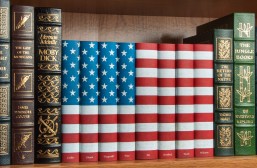 There is a plethora of great American literature, I could not create a list of less than 20. However, I focused less on the popularity of a novel/author and more on a variety and depth of “American ” (U.S.) content/concepts and ideas/ideals etc. Literature that focuses on the history, growth, and culture of our nation.
There is a plethora of great American literature, I could not create a list of less than 20. However, I focused less on the popularity of a novel/author and more on a variety and depth of “American ” (U.S.) content/concepts and ideas/ideals etc. Literature that focuses on the history, growth, and culture of our nation.
So, I was able to narrow it down…
Here is my list of the top quintessential American literary works:
PART I of II
Common Sense

Paine arrived in America from England in 1774. A friend of Benjamin Franklin, he was a writer of poetry and tracts condemning the slave trade. In 1775, as hostilities between Britain and the colonies intensified, Paine wrote Common Sense to encourage the colonies to break the British exploitative hold and fight for independence. The little booklet of 50 pages was published January 10, 1776 and sold a half-million copies, approximately equal to 75 million copies today.
Rated 4.6 on amazon.com
Their Eyes Were Watching God
By Zora Neale Hurston
Out of print for almost thirty years due largely to initial audiences’ rejection of its strong black female protagonist. Hurston’s classic has since its 1978 reissue become perhaps the most widely read and highly acclaimed novel in the canon of African-American literature.
Rated 4.4 on amazon.com
The Adventures of Huckleberry Finn
By Mark Twain
One of the most challenged or banned books due to racist language, Twain’s novel can be read as an indictment of unenlightened nineteenth-century thinking or as a heartbreaking coming-of-age novel, but what’s undisputed is the novel’s position as one of the most influential books in American literature.
Rated 4.3 on amazon.com
Book Bean: Iced Huckleberry Hibiscus
Brew some hibiscus tea add honey to taste and chill. Lightly crush a handful of fresh huckleberries (raspberries or marion/black berries are great too). Add berries and ice to a tall glass and pour in chilled tea.
The Scarlet Letter

An 1850 work of fiction in a historical setting, and is considered to be Hawthorne’s “masterwork”. Set in 17th-century Puritan Boston, Massachusetts, during the years 1642 to 1649, it tells the story of Hester Prynne, who conceives a daughter through an affair and struggles to create a new life of repentance and dignity. Throughout the book, Hawthorne explores themes of legalism, sin, and guilt.
Rated 4.0 on amazon.com
Uncle Tom’s Cabin
By Harriet Beecher Stowe
An anti-slavery novel published in 1852, the novel “helped lay the groundwork for the Civil War”, according to Will Kaufman.Wikipedia. Denouncing the institution of slavery in dramatic terms, the incendiary novel quickly draws the reader into the world of slaves and their masters.
Rated 4.5 on amazon.com
The Great Gatsby
By F. Scott Fitzgerald
An exemplary novel of the Jazz Age acclaimed by generations of readers. The story of the fabulously wealthy Jay Gatsby and his love for the beautiful Daisy Buchanan. It is an exquisitely crafted tale of America in the 1920s.
 Rated 4.3 on amazon.com
Rated 4.3 on amazon.com
Book Bean: Fitz SpritzerGreen tea chilled, fresh lime juice, sugar, and club soda. Pour mixture over ice and enjoy your own Green Rickey 😉 Make it fun, add an olive, lime wedges, and/or mint for garnish.
Leaves of Grass
By Walt Whitman
A visionary volume of twelve poems. Showing the influence of a uniquely American form of mysticism known as Transcendentalism, which eschewed the general society and culture of the time, the writing is distinguished by an explosively innovative free verse style and previously unmentionable subject matter.
Rated 4.2 on amazon.com
Beloved
By Toni Morrison
Staring unflinchingly into the abyss of slavery, the novel is inspired by the story of an African-American slave, Margaret Garner, who escaped slavery in Kentucky late January 1856 by fleeing to Ohio, a free state. Set after the American Civil War (1861-1865) this spellbinding novel transforms history into a powerful story as intimate as a lullaby.
Rated 3.9 on amazon.com
The Grapes of Wrath
By John Steinbeck
A Pulitzer Prize–winning epic of the Great Depression chronicles the Dust Bowl migration of the 1930s and tells the story of one Oklahoma farm family, the Joads, driven from their homestead and forced to travel west to the promised land of California.
Rated 4.5 on amazon.com
Book Bean: California Frappe
 Cut off peel and white pith from 2-3 orange wedges. Bring 1/2 cup of dry red wine, 2 Tsp. of sugar, a grate of orange zest, and 1/2 Tsp. of cinnamon to a simmer, add the orange wedges and simmer for approx. 10 min. mixture should reduce to a syrup, let chill. Pull 2 shots of espresso (or use 4 oz of brewed coffee chilled.) In a blender add ice, coffee, syrup (for an easier option use marmalade 😉 ), and milk (to taste) blend and enjoy!
Cut off peel and white pith from 2-3 orange wedges. Bring 1/2 cup of dry red wine, 2 Tsp. of sugar, a grate of orange zest, and 1/2 Tsp. of cinnamon to a simmer, add the orange wedges and simmer for approx. 10 min. mixture should reduce to a syrup, let chill. Pull 2 shots of espresso (or use 4 oz of brewed coffee chilled.) In a blender add ice, coffee, syrup (for an easier option use marmalade 😉 ), and milk (to taste) blend and enjoy!
Stay tuned for PART II this evening!
Share with us about your vote, what do you love about this author, and what makes them “A Great” in American literature?








A great list!
LikeLiked by 3 people
I agree with Darlene. This is an excellent list!
LikeLiked by 2 people
Thank you!
LikeLiked by 1 person
Wonderful list! I couldn’t choose the greatest American novelist. Just so fortunate we can enjoy and learn from their works.
LikeLiked by 2 people
Hi there and happy 4th of July! How would you personally rate “Uncle Tom’s Cabin” by Harriet Beecher Stowe? Is that book still of any relevance or would it merely by an interesting read – sylistically speaking? I’ve though of reading it, but then again I have so many really good books waiting to be read… 😉
LikeLiked by 1 person
Uncle Tom’s Cabin is more of a sentimental/nostalgic book. There is actually a lot of negative thoughts associated with Uncle Toms Cabin, mainly I believe because of the stereotypes in created. However, it will always deserve praise for the positive impact it had on the abolitionist movement when it was published. As for relevance today, probably not. There is an underlining message of love and redemption that could be relevant, but it’s not exclusive to this book.
LikeLiked by 1 person
Great choices! I also chose not to vote on the greatest American novelist because I couldn’t pick just one.
LikeLiked by 1 person
Wonderful choices.
LikeLiked by 2 people
I do need to read Huckleberry finn, and Toni Morrison. About the former, I am not sure one can “label” books written in the 19th century as “racist”, without taking the time in context… So many things have changed (and for the better, thinking Civil rights, for instance) that today’s viewing lens is not fully accurate. Am I making sense? Another example: one cannot really understand the grapes of wrath without knowing a good bit about the Great Depression. Yet another one: just read a comment about WWII veterans coming home “traumatized” from the war. That was not the case. Soldiers then did “what they had to do”, were demobilized, and got a job. End of story… 😉
Sorry for the ramble. 😉
LikeLiked by 1 person
Great list! Abbie, I was wondering what you thought of Last of the Mohicans? My former teacher, while noting it’s harshness, still considers it to be an American Classic. It was sorta hard for me, but I slugged through it 😛
LikeLiked by 1 person
I actually have not yet read it. It’s a book I’ve meant to read, just haven’t gotten around to.
LikeLike